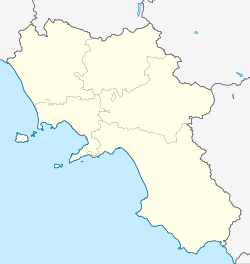Striano is an Italian municipality of 8,764 inhabitants in the Metropolitan City of Naples in Campania, located in the Sarno Valley.
Striano | |
|---|---|
 Civic Gate. | |
| Coordinates: 40°49′N 14°34′E / 40.817°N 14.567°E | |
| Country | Italy |
| Region | Campania |
| Metropolitan city | Naples (NA) |
| Government | |
| • Mayor | Aristide Rendina |
| Area | |
• Total | 7.6 km2 (2.9 sq mi) |
| Elevation | 22 m (72 ft) |
| Population | |
• Total | 8,371 |
| • Density | 1,100/km2 (2,900/sq mi) |
| Demonym | Strianesi |
| Time zone | UTC+1 (CET) |
| • Summer (DST) | UTC+2 (CEST) |
| Postal code | 80040 |
| Dialing code | 081 |
| Patron saint | Severinus of Noricum |
| Saint day | 8 January |
| Website | Official website |
Physical geography
editTerritory
editThe city is located in the Sarno Valley, the south-eastern portion of the Campanian plain, a plain nestled between the Apennine Mountains, Vesuvius, the Lattari Mountains and open towards the Tyrrhenian Sea.
It borders Palma Campania to the north, Sarno (SA) to the east, San Valentino Torio (SA) to the south, Poggiomarino to the west and San Giuseppe Vesuviano to the northwest; the right part of the municipality is bathed by the Sarno river. The municipal territory extends over a surface area of approximately 7.58 km² and its altitude above sea level is between 30 and 16 meters (22 meters in Piazza 4 Novembre). In this area, which is not particularly large, a sustained demand for housing is being triggered. The municipality is part of the Sarno River Hydrographic Basin Regional Park.
The population growth from 1998 to today is due to the fact that following a flood in nearby Sarno, many people settled in Striano, to get away from the risk areas. Another factor is the immigration of EU and non-EU citizens, as well as the excellent geographical position that guarantees efficient connections with the provincial capitals, Pompeii, the Neapolitan, Amalfi and Sorrento coastal strip.
Climate
editThe nearest weather station for which data are available is Naples Capodichino. According to monthly averages calculated over the period 1961-1990, the average temperature of the coldest month (January) is approximately +8.1 °C, while that of the warmest month (August) is approximately +23.7 °C. The average annual precipitation is approximately 1000 mm.
| Climate data for Striano (altitude: 22 metres (72 feet) above sea level.) | |||||||||||||
|---|---|---|---|---|---|---|---|---|---|---|---|---|---|
| Month | Jan | Feb | Mar | Apr | May | Jun | Jul | Aug | Sep | Oct | Nov | Dec | Year |
| Mean daily maximum °C (°F) | 12.5 (54.5) |
13.2 (55.8) |
15.2 (59.4) |
18.2 (64.8) |
22.6 (72.7) |
26.2 (79.2) |
29.3 (84.7) |
29.5 (85.1) |
26.3 (79.3) |
21.8 (71.2) |
17.0 (62.6) |
13.6 (56.5) |
20.5 (68.9) |
| Mean daily minimum °C (°F) | 3.8 (38.8) |
4.3 (39.7) |
5.9 (42.6) |
8.3 (46.9) |
12.1 (53.8) |
15.6 (60.1) |
18.0 (64.4) |
17.9 (64.2) |
15.3 (59.5) |
11.6 (52.9) |
7.7 (45.9) |
5.1 (41.2) |
10.5 (50.9) |
| Average precipitation mm (inches) | 104.4 (4.11) |
97.9 (3.85) |
85.7 (3.37) |
75.5 (2.97) |
49.6 (1.95) |
34.1 (1.34) |
24.3 (0.96) |
41.6 (1.64) |
80.3 (3.16) |
129.7 (5.11) |
162.1 (6.38) |
121.4 (4.78) |
1,006.6 (39.63) |
| Average relative humidity (%) | 75 | 73 | 71 | 70 | 70 | 71 | 70 | 69 | 73 | 74 | 76 | 75 | 72.3 |
| Mean monthly sunshine hours | 111 | 132 | 153 | 189 | 237 | 279 | 303 | 285 | 234 | 183 | 126 | 102 | 2,334 |
| [citation needed] | |||||||||||||
- Climate classification of Striano:
- Climate zone C, 1178 DD.
Origins of the name
editThere are conflicting opinions on the toponym of the municipality. The toponym Striano is of Roman origin. A fundus Histrianus is cited in the Velleja table and Striano is its apheretic form. In the Middle Ages we find the toponym Histricanum cited in the Bull of erection of the Diocese of Sarno of 1066. Traditionally it was thought that it came from Istra, an erroneous place of origin of Saint Severinus, the patron saint of the municipality. Recently, through studies and research, it has been demonstrated that the toponym derives exactly from the characteristic configuration of the Strianese lands called stigati, and from the way of working them.
Sources
edit- Striano: history, traditions and flavours, tour guide
References
edit- ^ "Superficie di Comuni Province e Regioni italiane al 9 ottobre 2011". Italian National Institute of Statistics. Retrieved 16 March 2019.
- ^ All demographics and other statistics: Italian statistical institute Istat.
- ^ "Popolazione Residente al 1° Gennaio 2018". Italian National Institute of Statistics. Retrieved 16 March 2019.



